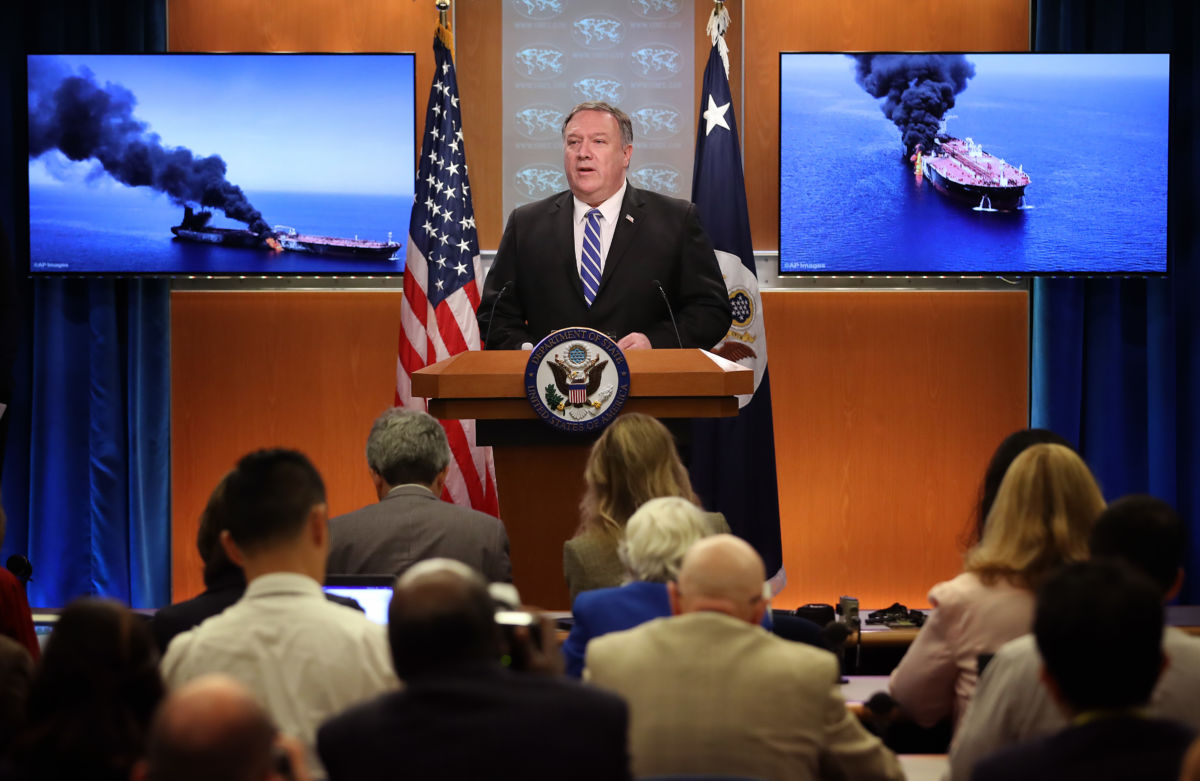It is becoming increasingly evident that National Security Advisor John Bolton and Secretary of State Mike Pompeo—President Trump’s top two foreign policy appointees—are manufacturing a crisis in order to catapult the United States into an explosive conflict with Iran.
This shouldn’t be remotely surprising, given their track records of supporting regime change across the Middle East, opposing the Iran nuclear deal and salivating at the prospect of bombing Tehran. Given these actions, it is frustrating to see many reporters simply parroting their unverified claims. This is exactly what Bolton and Pompeo are counting on: They want the public to be looking the other way.
On June 13, Pompeo delivered his assessment that Iran was behind that day’s incident in the Gulf of Oman, when two oil tankers were reportedly attacked with limpet mines. In his five-minute remarks, he provided no evidence and took no questions.
Pompeo’s assertion follows a similar pattern of behavior from Bolton, who claimed last month that Iran had deployed ballistic missiles on small Iranian sailing vessels––an extremely unlikely possibility, given the size of the ships and the notable lack of previous ship-based missile tests. He also claimed that Iran was responsible for subsequent attacks on Saudi ships.
Like Pompeo, Bolton provided zero evidence for his claims. An anonymous government official has even stated that the “new intelligence of an increased Iranian threat was ‘small stuff’ and did not merit the military planning being driven by Mr. Bolton.”
Despite the lack of evidence for Iran’s “escalatory behavior,” as they call it, Bolton and Pompeo have used these incidents to justify escalations of their own. Under their direction, the United States has deployed a Carrier Strike Group and a bomber task force to the region, partially evacuated the U.S. embassy in Baghdad, deployed 1,500 U.S. troops to the region, designated the Iranian Revolutionary Guard Corps––a branch of Iran’s armed forces––as a terrorist organization, and issued a threatening statement against the Iranian government. Given the clear parallels with the prelude to the Iraq War––of which Bolton was a key architect–– Bolton and Pompeo appear to be attempting to trigger a military crisis or regime change once again.
Some Members of Congress, however, are trying to stop them.
During the early hours of the June 12 debate over next year’s National Defense Authorization Act, Representatives Elissa Slotkin and Matt Gaetz recalled being given a “full formal presentation” by Pompeo “on how the 2001 [Authorization on the Use of Military Force] might authorize war with Iran.” The 2001 AUMF––passed in the immediate wake of 9/11—is essentially a blank check that gives the government unlimited war-making powers, and has been used to justify U.S. military engagement in nearly a dozen countries.
In an attempt to limit the broad authority of the AUMF, Representatives Ro Khanna, Anthony Brown, John Garamendi and presidential candidate Seth Moulton have introduced an amendment to the NDAA that would explicitly prohibit the United States from using military force in or against Iran, unless Congress has declared war.
The representatives withdrew their amendment during the mark-up; however, House Armed Services Committee (HASC) chairman Adam Smith promised that a similar proposal would be re-introduced when the NDAA eventually comes to a vote on the House floor next month. The amendment has bipartisan support; the top Republican on HASC, Rep. Mac Thornberry, explicitly stated during the early morning mark-up that the 2001 AUMF does not authorize war with Iran.
As Representative Brown noted in a collective press release, “The Trump administration cannot set us down the path to war with Iran without Congressional approval, no matter how many specious arguments they make about previous and unrelated authorizations.” Representative Moulton described the clear parallels between Iran and Vietnam: “The Administration seems to be hoping to provoke a situation like the Gulf of Tonkin incident that they would use to justify a U.S. response.”
Interestingly, Bolton and Pompeo’s quest for war with Iran has publicly put them at odds with President Trump, who reportedly told his acting Secretary of Defense that “he does not want war with Iran.” It also puts them at odds with some of Trump’s strongest supporters, like Fox News’ Laura Ingraham and Tucker Carlson, who have publicly stated that a war with Iran would lower his electability in 2020. If this is the case, then sustained public, media and congressional pressure might prompt Trump to realize that enabling his top two foreign policy appointees is simply more trouble than it’s worth.
Our most important fundraising appeal of the year
December is the most critical time of year for Truthout, because our nonprofit news is funded almost entirely by individual donations from readers like you. So before you navigate away, we ask that you take just a second to support Truthout with a tax-deductible donation.
This year is a little different. We are up against a far-reaching, wide-scale attack on press freedom coming from the Trump administration. 2025 was a year of frightening censorship, news industry corporate consolidation, and worsening financial conditions for progressive nonprofits across the board.
We can only resist Trump’s agenda by cultivating a strong base of support. The right-wing mediasphere is funded comfortably by billionaire owners and venture capitalist philanthropists. At Truthout, we have you.
We’ve set an ambitious target for our year-end campaign — a goal of $250,000 to keep up our fight against authoritarianism in 2026. Please take a meaningful action in this fight: make a one-time or monthly donation to Truthout before December 31. If you have the means, please dig deep.
